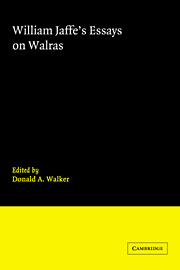Book contents
- Frontmatter
- Contents
- Preface
- Acknowledgments
- Introduction
- PART I WALRAS'S BIOGRAPHY
- PART II THE GENESIS AND DEVELOPMENT OF WALRAS'S IDEAS
- PART III THE SCOPE OF WALRAS'S WORK
- PART IV SPECIAL TOPICS IN WALRAS'S ECONOMICS
- PART V WALRAS'S PLACE IN THE HISTORY OF ECONOMIC THOUGHT
- 15 Reflections on the importance of Léon Walras (1971)
- 16 Léon Walras's role in the “marginal revolution” of the 1870s (1972)
- 17 Menger, Jevons and Walras de-homogenized (1976)
- 18 The normative bias of the Walrasian model: Walras versus Gossen (1977)
- 19 Walras's economics as others see it (1980)
- Index
16 - Léon Walras's role in the “marginal revolution” of the 1870s (1972)
Published online by Cambridge University Press: 05 May 2010
- Frontmatter
- Contents
- Preface
- Acknowledgments
- Introduction
- PART I WALRAS'S BIOGRAPHY
- PART II THE GENESIS AND DEVELOPMENT OF WALRAS'S IDEAS
- PART III THE SCOPE OF WALRAS'S WORK
- PART IV SPECIAL TOPICS IN WALRAS'S ECONOMICS
- PART V WALRAS'S PLACE IN THE HISTORY OF ECONOMIC THOUGHT
- 15 Reflections on the importance of Léon Walras (1971)
- 16 Léon Walras's role in the “marginal revolution” of the 1870s (1972)
- 17 Menger, Jevons and Walras de-homogenized (1976)
- 18 The normative bias of the Walrasian model: Walras versus Gossen (1977)
- 19 Walras's economics as others see it (1980)
- Index
Summary
On the occasion of a centenary, far from being a fault, it is particularly fitting to tell a twice-told tale … lest we forget, lest we forget. Although so much has already been written, and well written, by this time about the “marginal revolution” that it is difficult to think of anything new to say, yet there is a danger that we may forget what transpired a hundred years ago in the history of economic theory, because that “revolution” has been so radically transformed and transmuted since its beginnings that all trace of its pristine character tends to fade away in our memories.
The successive and often contradictory reevaluations of the “marginal revolution” of the 1870s leave the historian of economics in the 1970s perplexed, wondering whether it is more appropriate dolefully to commemorate the “marginal revolution” as a disaster or joyfully to celebrate the event as heralding a great leap forward in the progress of economics. If the historian recalls his right role, however, he will do neither, but be guided in his judgment of a Jevons, a Menger, or a Walras by Shakespeare's sage comment, “So our virtues/Lie in the interpretation of the time” (Coriolanus, IV, vii).
- Type
- Chapter
- Information
- William Jaffe's Essays on Walras , pp. 288 - 310Publisher: Cambridge University PressPrint publication year: 1983



